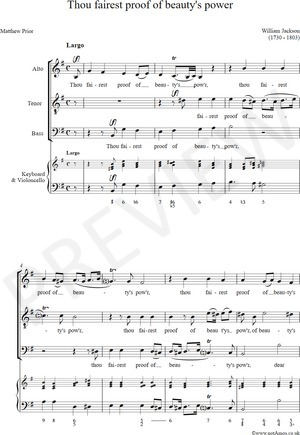 notAmos Performing Editions 1 Lansdown Place East, Bath BA1 5ET, UK +44 (0) 1225 316145 Performing editions of pre‑classical music with full preview/playback and instant download |
Violoncello part (PDF), €0.00 for unlimited copies Download this item
Printable cover page (PDF), €0.00 for unlimited copies Download this item
Score, part(s) and cover page (PDF), €0.00 for bundled copies Download this item
If you have any problem obtaining a PDF, please see our help page. If that does not resolve the issue, please click here.
Click on the illustration to display a larger version

This work, Jackson (of Exeter) : Thou fairest proof of beauty's power : scoreid 146924, as published by notAmos Performing Editions, is licensed under a Creative Commons Attribution-ShareAlike 4.0 International License. All relevant attributions should state its URL as https://www.notamos.co.uk/detail.php?scoreid=146924. Permissions beyond the scope of this licence may be available at https://www.notamos.co.uk/index.php?sheet=about.
| Enquire about this score |
| About William Jackson |
| Full Catalogue |
| About us | Help, privacy, cookies |
| About William Jackson |
| Full Catalogue |
| About us | Help, privacy, cookies |
Elegy VI from Jackson's Elegies, Op. 3, 1762.
In his frontispiece, Jackson specified performance in the following terms: "I would just observe, that the following pieces will lose their effect, when the parts are doubled. The manner of performance that I would recommend, is by three voices singing moderately soft, and accompanied with any bass instrument that may have the effect of an accompaniment only; for nothing hurts a piece so much, as making a part principal, or even equal with others, when it was intended to be subservient. The equality of strength among the voices should also be observed; if one voice of the three be strong, and the others weak, it is necessary to soften it down, that the balance may not be destroyed; for it should always be remembered, that as no principal part was intended, there must be none produced".
In his frontispiece, Jackson specified performance in the following terms: "I would just observe, that the following pieces will lose their effect, when the parts are doubled. The manner of performance that I would recommend, is by three voices singing moderately soft, and accompanied with any bass instrument that may have the effect of an accompaniment only; for nothing hurts a piece so much, as making a part principal, or even equal with others, when it was intended to be subservient. The equality of strength among the voices should also be observed; if one voice of the three be strong, and the others weak, it is necessary to soften it down, that the balance may not be destroyed; for it should always be remembered, that as no principal part was intended, there must be none produced".
Lyrics: Matthew Prior
Thou fairest proof of beauty's pow'r,
Dear idol of my panting heart,
Nature points this my fatal hour!
And I have lived, and we must part.
Whilst now I take my last adieu,
Heave thou no sigh nor shed a tear,
Lest yet my half-closed eye may view
On earth an object worth its care.
From jealousy's tormenting strife
For ever be thy bosom freed;
That nothing may disturb thy life,
Content I hasten to the dead.
Yet when some better fated youth
Shall thee to am'rous parley move,
Reflect one moment on his truth,
When dying thus persists to love.
Thou fairest proof of beauty's pow'r,
Dear idol of my panting heart,
Nature points this my fatal hour!
And I have lived, and we must part.
Whilst now I take my last adieu,
Heave thou no sigh nor shed a tear,
Lest yet my half-closed eye may view
On earth an object worth its care.
From jealousy's tormenting strife
For ever be thy bosom freed;
That nothing may disturb thy life,
Content I hasten to the dead.
Yet when some better fated youth
Shall thee to am'rous parley move,
Reflect one moment on his truth,
When dying thus persists to love.

